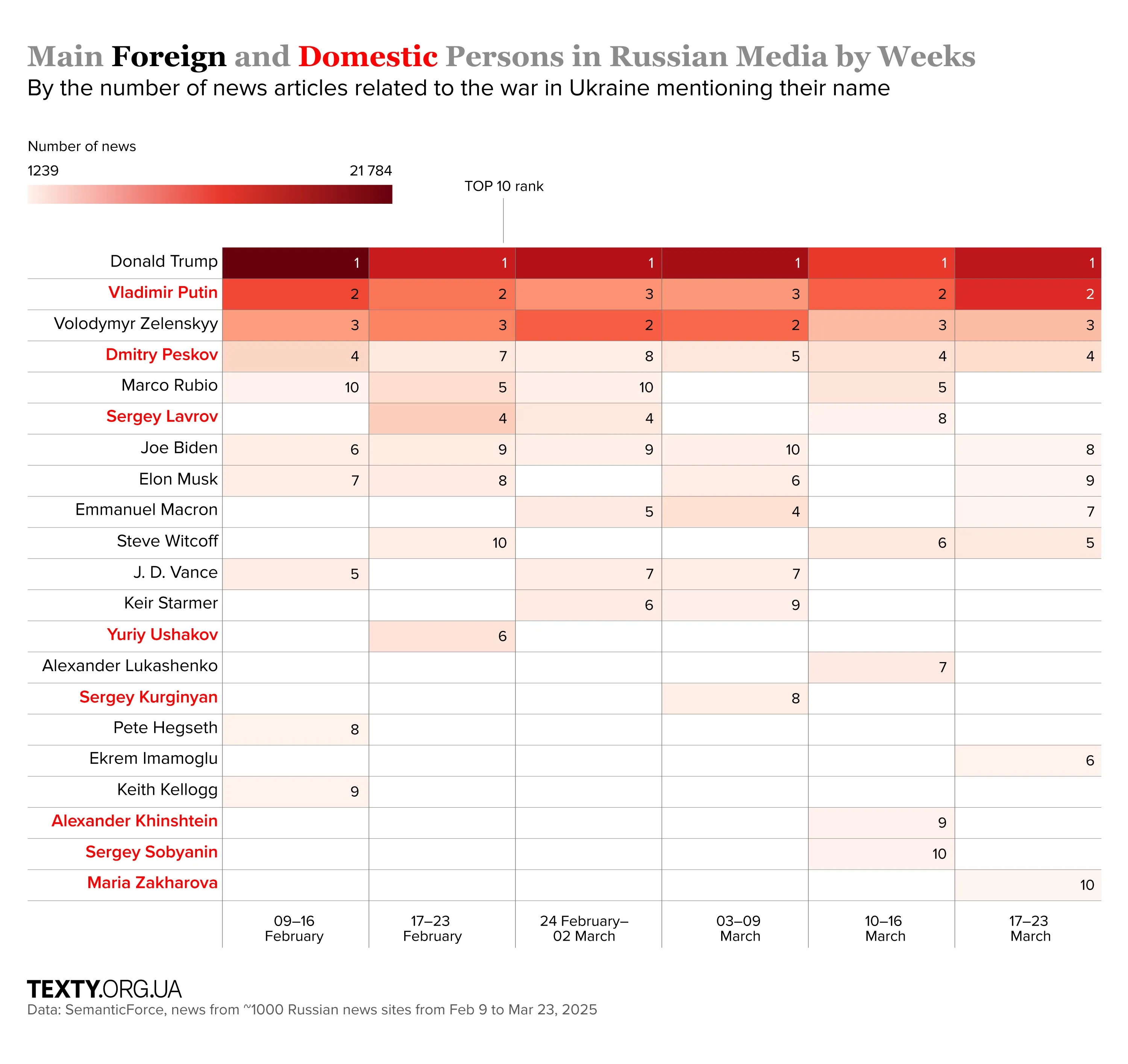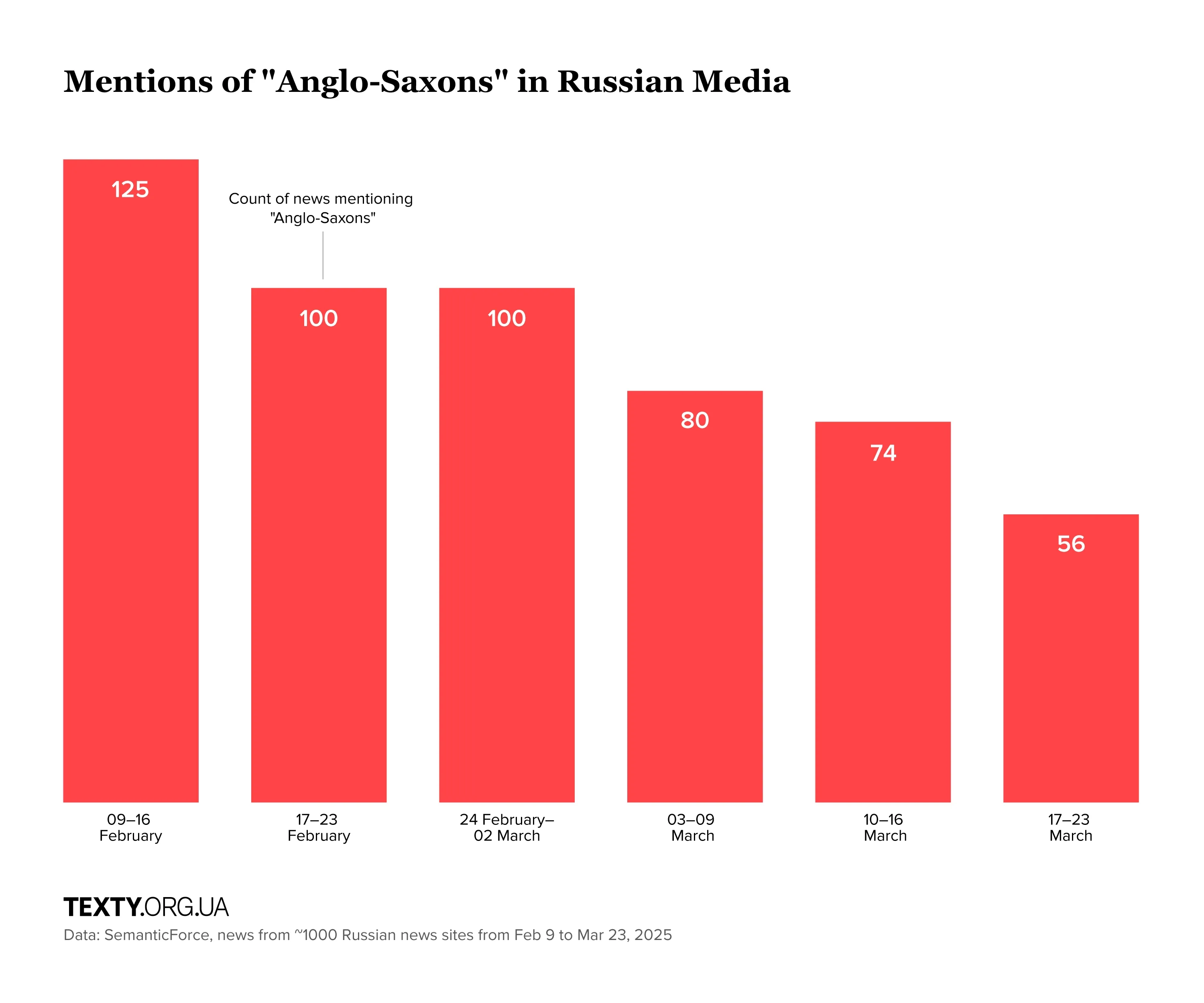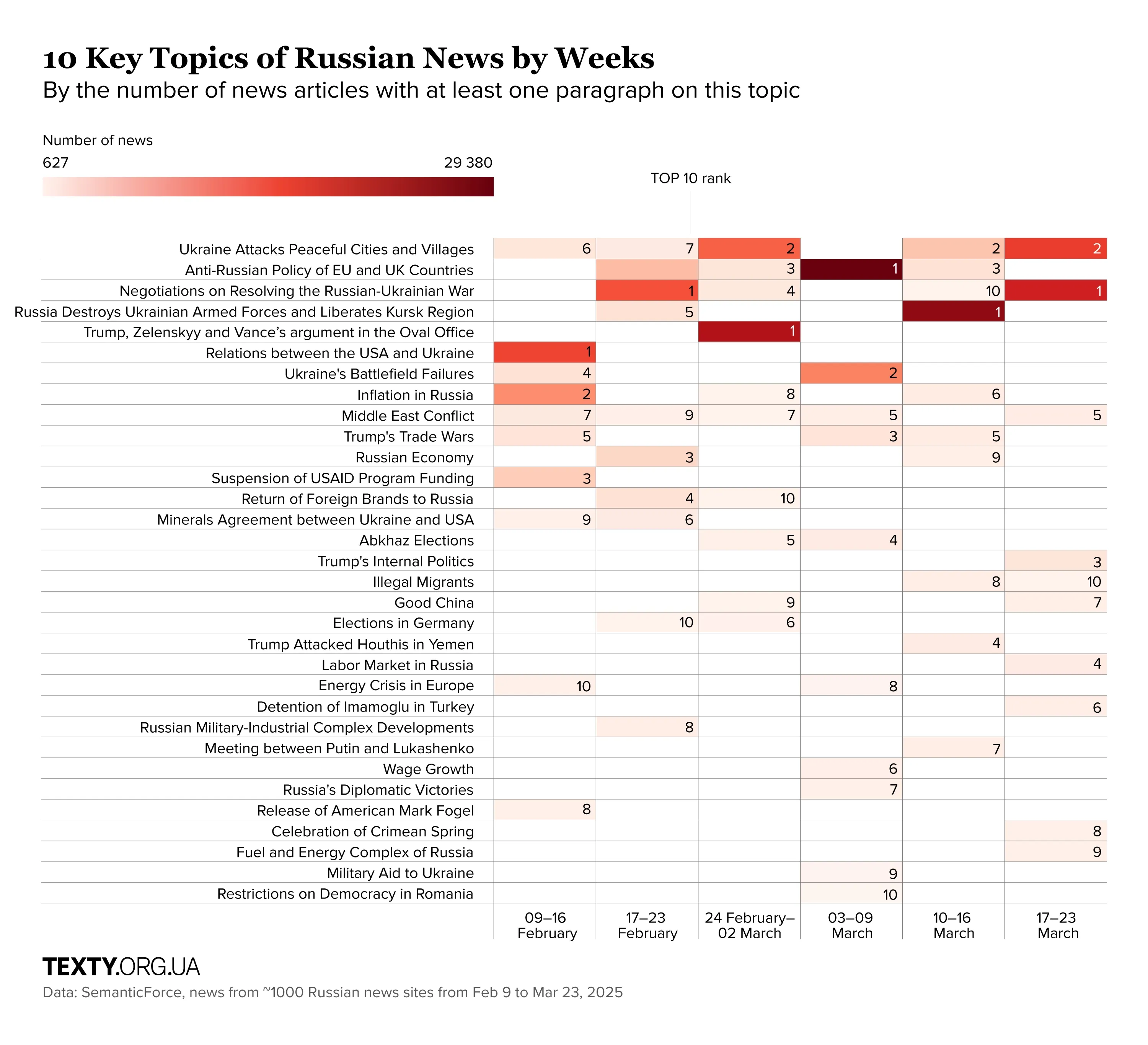Good Americans and bloodthirsty Europeans. Monitoring of Russian media in February-March 2025
Donald Trump has become the center of attention in the Russian media, surpassing even Vladimir Putin in the number of mentions. His statements are becoming part of the Kremlin's propaganda, which uses them to support the narrative of Russia's "rightness" in the war and attempts to establish peace on the Kremlin's terms. The propaganda actively shapes the image of the United States, where Trump personifies a "right" American who can change the White House's policy in favor of Russia.
At the same time, propagandists do not forget to turn Europe into a new enemy, replacing old narratives about "Anglo-Saxons" with new expressions that are offensive, such as European bureaucrats and British politicians.
This article explored the main topics that dominated the Russian information space. We also analyzed the key people mentioned in the Russian media. The monitoring summarizes our previous studies on the attitude of propaganda towards the United States after the presidential election and on the coverage of peace talks between Russia and Ukraine in the Russian media
Friends and enemies of Russia
In February and March 2025, Donald Trump became the main figure in the Russian media. The Russian media give Trump a huge amount of attention, compared to the attention they give even to Putin himself.
During the study period, he outnumbered Putin regarding the number of references each week. It seems as if Trump is the president of Russia, as the Russian media follow his every move, from domestic policy measures to every statement made by the American leader.

With Donald Trump, Russian propaganda has received a new impetus. The US president has repeatedly spoken warmly about Russia and Putin, and each such statement is instantly picked up by the Russian media, turning into proof that the Kremlin is right to wage war against Ukraine.
Trump says he understands the logic and reasons for the war, and the next day, the headlines are full of statements about Putin's absolute rightness. Trump declares that he respects the Russian people, and the propaganda immediately presents this as proof that Washington recognizes Moscow as an equal player. As a result, Russia appears not as a regional power but as a full-fledged pole of global power - at least in the mirror of its own information machine.
The number of mentions in the Russian media shows that "right Americans" have emerged for the Russian audience, and Trump is not the only one. Of the 21 unique people mentioned in the Russian media, eight were Americans, and only two of them were portrayed in an exclusively negative light.
The main antagonist is former US President Joe Biden. It is he who is blamed for the outbreak of the war: Biden, in the Russian propaganda narrative, is an agent of the "deep state" who sought to draw the United States and the entire collective West into a global confrontation with Russia that could have escalated into World War III. But now Trump is coming on the scene to correct the Democrats' "mistakes," change America's aggressive course, and allegedly "reconcile" Moscow and Washington on terms favorable to the Kremlin.
Another figure who has fallen out of favor with the Russian media is US Special Envoy for Ukraine Keith Kellogg. For the propagandists, he is the embodiment of everything they hate: he does not respect Russia enough, supports Ukraine, dares to blame the Kremlin, and even "blackmail" it. Kellogg is presented as a representative of the same "deep state" and military-industrial complex, which, they say, only wants to prolong the war.
The other Americans on the list are "good Americans" who either pick up Kremlin narratives or speak in a way that allows propaganda to build the desired picture of the world.
US Secretary of State Mark Rubio earned this title thanks to his "excellent" meetings with his Russian counterparts. It was he who resumed diplomatic contacts with Moscow, helped bring Russian diplomats out of international isolation, and in early March voiced the idea that Russia's war against Ukraine is a proxy war between two nuclear powers - the United States, which supports Kyiv, and Russia. This statement was a victory for the Kremlin's disinformation campaign: the key thesis of Russian propaganda has been confirmed at the highest level in the United States.
Elon Musk, the head of the Department of Government Effectiveness (DOGE), has become a favorite of the Russian media due to his systematic dissemination of pro-Russian narratives. He talks about Russia's "victories" at the front, criticizes Zelenskyy, and distributes videos about "illegal and ruthless" mobilization in Ukraine. He opposes the "deep state" and "liberal values," and he has also succeeded in closing the USAID agency, which is traditionally accused in Russia of funding "terrorists," anti-Russian forces, and color revolutions in the post-Soviet space.
Support TEXTY.org.ua
TEXTY.ORG.UA is an independent media without intrusive ads and puff pieces. We need your support to continue our work.
US Special Envoy to the Middle East Steve Vitkoff is Trump's de facto personal ambassador to Putin. His role in the Russian media is simple: he has repeatedly praised the Russian president, saying he trusts and believes in Russia's peacefulness. For propagandists, this is enough to consider him a "friend."
US Vice President J.D. Vance gained favor with the Kremlin media in February when he criticized the EU leadership at the 61st Munich Security Conference, accusing it of "retreating from freedom of speech and democracy." However, he really gained notoriety in late February when a diplomatic scandal between the presidents of the United States and Ukraine broke out in Washington. According to the Russian media, Vance "told off" and "put in place" the Ukrainian leader.
According to propagandists, the new US Secretary of Defense, Pete Hagel, was praised for his sobriety in February statements: He admitted that Ukraine's accession to NATO and return to the 2014 borders are "unrealistic goals." Such statements are presented in the Kremlin media not as personal opinions but as a signal that "Washington is gradually coming to its senses."
At the moments when the Americans become "negotiable," show a willingness to "help" end the war, and begin to understand the Kremlin's "concerns," a new main enemy appears on the scene: the Europeans.
A few months ago, Russian Foreign Minister Sergei Lavrov claimed that the main enemy was "the Anglo-Saxons led by the United States." But now the main enemy is the Eurobureaucracy and the British.
At the same time, the term "Anglo-Saxons," which had a negative connotation, is gradually losing popularity in the Russian media. While in February it was mentioned in 125 news stories, this trend is declining with each passing month. The enemy is being transformed: instead of the abstract West, it is the concrete Brussels, London, Paris, and Berlin.

In the modern sense the word "Anglo-Saxons," these are English-speaking countries: The United Kingdom, the United States, Canada (with the exception of Quebec), Australia, and New Zealand. In addition to language, they are united and distinguished from the rest of the world by certain political and legal institutions. In the rhetoric of Russian propaganda, "Anglo-Saxons" is a euphemism for Russia's enemies and ill-wishers. In Russia's worldview, there has always been a three-part model of the world: Russia, the Anglo-Saxons, and Europe, which often sides with the Anglo-Saxons.
Today, the "enemy center" has shifted to Europe. Other formulations have been used: "Eurobureaucrats," 'European warmongers,' 'Euro-Atlantic Russophobes,' 'European political dwarfs,' 'macrono-fascists,' 'German militarists,' and" British colonialists." Russian Foreign Ministry spokesperson Maria Zakharova introduces a new term, "British-Yesovites" ("YESovites" is similar to "SS").
One of the main figures in the "enemy camp" in the Russian information space is France, led by Emmanuel Macron. On March 5, he made a statement caused by global uncertainty that arose from the change in US policy toward Ukraine under Donald Trump's leadership. Macron emphasized that the threat from Russia extends to Europe, stressing that "this is not just a Russian-Ukrainian conflict, it is an international conflict."
Propagandists immediately interpreted these words as a "declaration of war on Russia." They began to portray him as a new Napoleon, who had gathered all of Moscow's enemies around him but, like his historical namesake, would inevitably be defeated.
The British Prime Minister also found himself in the center of attention of the Russian media. On the one hand, he deserves the title of "first among the Anglo-Saxons" like no other, but on the other hand, there is always a universal cliché in the propaganda arsenal to characterize him: "The British are shit." These two words encapsulate the whole essence of the attitude towards London: Russia's eternal enemy, the historical center of intrigue and intrigue, a country that has been holding back Moscow for centuries and supporting all its opponents, from terrorists to "Ukrafascists."
Against the backdrop of Trump's "peaceful" statements, propagandists are putting forward a new narrative: that even if the United States wants to stop the war, the United Kingdom and the EU will not allow it. In this version, Zelenskyy is not an independent figure but a puppet of London. And as long as he feels the support of Europe, Trump will not be able to influence Zelenskyy.
The main topics in the Russian media
"Anti-Russian policy of the EU and the UK" was one of the stable topics in the Russian media during the monitored period. This category includes all news about anti-Russian attacks by Europeans, from sanctions to statements insulting the Russian president.

Russian media traditionally focus on foreign policy to divert attention from domestic problems. For years, the propaganda machine has been building the image of the West in the minds of ordinary Russians as an eternal enemy that seeks to hinder Russia's development and threatens the "Russian world" and its "traditional values." The Kremlin always needs enemies - if there are no real threats, they are invented. The "anti-Russian card" is becoming the main media tool: it consolidates society, keeps the illusion of a "besieged fortress" alive, and emphasizes the importance of the Russian leadership as a defender of the common people against external encroachments.
In parallel, propaganda promotes the idea of the unique advantages of Russian statehood. "People's sovereignty," 'technological independence,' and 'special Russian democracy' appear regularly in the media. That is why the Russian media closely follow elections in other countries: any instability or disputes there become the basis for another statement that "everything is better in Russia." For example, in the stories "Elections in Germany" and "Restrictions on Democracy in Romania," the emphasis is on the repression of the opposition and fraud, which, according to propagandists, demonstrates the collapse of democracy in the West.
Another important block is the economy. The news constantly discusses "stable growth": rising wages, increasing GDP, and a flourishing fuel and energy sector. The only exception is inflation—it cannot be hidden entirely. Still, even here, propaganda assures us that these are "temporary difficulties" and that everything will soon return to economic prosperity.
Another consistent line is the demonization of Ukraine. The Russian media systematically accuse Kyiv of "terrorist attacks" on peaceful Russian cities, painting an image of an enemy that "fights dishonestly" and deliberately targets civilians. At the same time, Russian military strikes in Ukraine are always presented as "acts of retaliation" exclusively against military targets. Special emphasis is placed on Ukraine's failures at the front. Propaganda actively exploits the theme of the "catastrophic state" of the Ukrainian army and the latest emotional outburst was caused by the stories about the "liberation of the Kursk region."
During the monitored period, Russian media paid special attention to relations between Ukraine and the United States. They closely monitored every step of the new US administration, from the introduction of a new status for the English language in American schools to initiatives to limit migration flows.
One of the key topics was the agreement between Kyiv and Washington on mineral resources. In the Russian media, it is presented as proof of Ukraine's colonial status: the Ukrainian government is allegedly ready to "surrender national interests" to maintain its power. Ukraine is portrayed as a "US colony," and Russia's "special military operation" is presented as a way to return to Ukraine's sovereignty. The propaganda imposes the idea that Ukrainians should welcome this "liberation" and rebel against the "regime" that seeks to wage war "to the last Ukrainian" in the interests of "overseas masters." Interestingly, the United States is accused of trying to seize Ukrainian resources, not Donald Trump personally. And some propagandists even admire such attempts, hinting that Trump is a pragmatist and can only get what he wants through pressure and without war.
One of the main topics was the news about the negotiation process between the US, Russia, and Ukraine (the topic was covered in detail in our previous monitoring)
Russian propaganda continues to promote the narrative that Moscow seeks peace, while Kyiv and Europe allegedly favor continuing the war. In March, the United States held a series of talks with Russia and Ukraine. The mere hint of a possible cessation of hostilities provoked various reactions in the Russian information space.
The so-called "warriors," who represent an active part of Russian society, openly call for the war to continue "until the end." Their voices are loud on social media, but the official Russian media remains within the framework of a controlled narrative.
Official propaganda broadcasts the position of the Russian leadership: The United States allegedly wants to help establish peace, but this is being hindered by "hostile forces" that are blocking agreements that, of course, must take into account Russia's "concerns" and interests.
The research period covers January 1 - March 30, 2025.
We analyzed news stories from about 1,000 Russian websites and major telegram channels to monitor disinformation.
The January and early February data were incomplete, so we analyzed this period using non-technical methods.
The complete news stories (starting from February 9) were processed using automatic topic detection methods. The data from Russian websites was collected and provided to us by SemanticForce. In particular, we applied appropriate topic detection algorithms to each paragraph. Among these topics (groups of similar content), we identified those related to the war or its consequences for Russia. Next, we obtained data for each material on the website regarding mentions of a particular topic. Our conclusions are based on this data and examples of paragraphs related to the topic.
Data for January 1 - February 9 were manually processed by three channels for the following period.
The material was prepared with the support of the European Union and the International Renaissance Foundation within the framework of the joint initiative "European Renaissance of Ukraine." It represents the position of the authors and does not necessarily reflect the position of the European Union or the International Renaissance Foundation.


